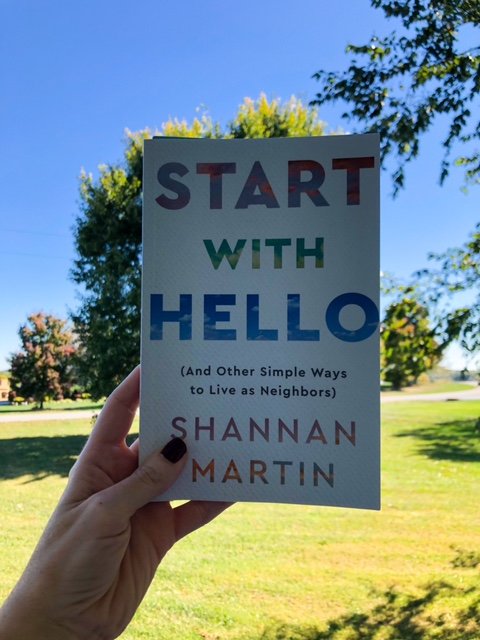Start With Hello
When I visit my grandmother, she has many conversational themes to which she returns repeatedly. Her worry for my uncle, how much she loves when we visit, her gratitude to my sister for cleaning her house, and her frustration with the way pieces of her farm are changing are all on a steady rotation. But a more recent piece that seems to truly nag at her mind is the issue of her neighbors.
“It used to be that neighbors took care of each other,” she tells me. “It’s not that way anymore.” A number of new houses has grown up down her road, and she worries over them, not because she is offended that they may not be the kind of neighbors she wants to have, but because they are new and she cannot so easily introduce herself and make sure they know each other as she would have ten years ago. It feels very wrong to her to have families on her street whom she does not know well.
Then she turns her gaze on me. “Do you know all your neighbors?” she demands, and I try not to look away while I tell her that I don’t. I have spoken to all of them; I’ve sent over a present for a kid’s first birthday. I do not talk to them regularly, and I’m really bad at remembering all of their names.
“Well,” she sighs, “you’re busy, and that makes a difference.” It does, but it’s not like she didn’t live a busy life too. I feel guilty every time she returns to this topic. I should know my neighbors. I should be a better neighbor, both for the sake of friendliness and because the Bible tells me to do it. But I’ve lived here a long time. What am I supposed to do now? Where do I even begin?
Enter Shannan Martin. Her new book, Start With Hello, is both a commentary on and a manual for being a good neighbor. She shares all the ways that living into the life of her actual neighborhood has changed her own life–making it more rewarding and tender, and also challenging her. Her attitude toward neighbors is, “I get out among people and learn to see. I collect more data on what it means to be fully alive in this particular chaos and in the precise brilliance that is now.” She talks about listening to others, respecting their boundaries, putting down roots, and holding an open door.
It’s so much easier to be nice to people online, or to be nice to people in a store, than it is to be nice to the people who work in the classrooms around me and who have some control over the temperature of my office. It’s harder to be nice to people who don’t clean up after their dogs in my yard, or who know exactly what I said when my son hit his sister with the (plastic) baseball bat. Home is where I am my most real self, and the people who live and work around me see more of me than I’d like to admit.
It’s hard sometimes to be a good neighbor because of that inherent vulnerability. I don’t want people to know if I lock myself out, and I don’t want people to know I need one more set of hands to help move a piano from the truck to my foyer. I just want to look like I’ve got it all together, all the time. But that’s not real life, and that’s actually a stunted life. Shannan Martin says, “We don’t pursue connection because we know it will be easy. We pursue connection because we believe it multiplies our possibilities for wholeness.” I very much want that wholeness, and I want to know other people’s wholeness too. Being presented with the perfect facades I would like to give other people is lonely and tiring.
I may not know everything about my neighbors, but I know who has kids. I know who will always wave when my husband and I walk by. I know who has the best decorations at Halloween, and I know they don’t mind if my son runs all over their yard to look at them. I may not know my neighbors in the way my grandmother would like, but it’s a start. And thanks to Shannan Martin, I have some ideas for where to go from here.
